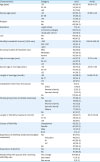Abstract
Purpose
To determine effects of irrational parenthood cognition, family support, and resilience on depression in infertile women.
Methods
Subjects were 118 infertile women who agreed to participate in this study. Data were collected from April 16 to July 31, 2018. Collected data were analyzed using descriptive statistics, t-test, analysis of variance (ANOVA), Pearson's correlation and multiple regression with SPSS WIN 23.0 program.
Results
Depression significantly differed according to the burden of treatment cost and presence of people giving stress. Depression showed significantly positive correlation with irrational parenthood cognition and significantly negative correlations with family support and resilience. Factors affecting depression were irrational parenthood cognition, family support, and resilience. Irrational parenthood cognition had the greatest effect on depression. These three variables explained 35.8% of total variance.
Conclusion
Irrational parenthood cognition, family support, and resilience affected depression of infertile women, with irrational parenthood cognition having the greatest effect. Therefore, it is important to develop and implement programs that can reduce irrational parenthood cognition and increase family support and resilience in order to lower depression of infertile women. The authors declared no conflict of interest.
Figures and Tables
Table 1
General and Infertility Related Characteristics of Subjects (N=118)

Table 2
Degree of Irrational Parenthood Cognition, Family Support, Resilience and Depression (N=118)

Table 3
Depression according to General and Infertility Related Characteristics (N=118)

Table 4
Correlation among a Study Variables (N=118)

Table 5
Factors Influencing on Depression (N=118)

Summary Statement
-
• What is already known about this topic?
Depression of infertile women is known to be higher than that of women who are fertile -
• What this paper adds?
This paper reveals that irrational parenthood cognition, family support, and resilience can affect depression of infertile women, among which irrational parenthood cognition is the most influential. -
• Implications for practice, education and/or policy
There is a need to change irrational parenthood cognition to decrease depression of infertile women.
References
1. Hwang NM, Lee SH, Jang IS. The 2016 analyzing and evaluating the results of supporting projects. Sejong: Korea Institute for Health and Social Affairs;2017. p. 43–138.
2. Hwang NM. Factors related to the depression of infertile women. Health and Social Welfare Review. 2013; 33(3):167–187.
3. Lee DY. Health insurance application of infertility treatment and dementia test [Internet]. Seoul: Ministry of Health and Welfare;2017. cited 2018 Dec 17. Available from: http://www.mohw.go.kr/react/al/sal0301vw.jsp?PAR_MENU_ID=04&MENU_ID=0403&CONT_SEQ=341710&page=1.
4. Ha YY. Characteristics of MMPI finding in infertile women. Journal of Korea Women's Research Institute. 2007; 22:175–189.
5. Domar AD. The mind/body connection: the Boston IVF handbook of infertility. Boston: Information Healthcare;2007.
6. Lee SS, Park JS, Lee SY, Oh MA, Choi HJ, Song MY. The 2015 national survey on fertility and family health and welfare. Sejong: Korea Institute for Health and Social Affairs;2015.
7. Fekkes M, Buitendijk SE, Verrips GH, Braat DD, Brewaeys AM, Dolfing JG, et al. Health-related quality of life in relation to gender and age in couples planning IVF treatment. Human Reproduction. 2003; 18(7):1536–1543.


8. Farzadi L, Ghasemzadeh A. Two main independent predictors of depression among infertile women: an Asian experience. Taiwanese Journal of Obstetrics & Gynecology. 2008; 47(2):163–167.


9. Yang SR, Yeo JH. Effects of irrational parenthood cognition, post traumatic stress disorder and spousal support on quality of life of infertile women. Korean Journal Women Health Nursing. 2017; 23(2):145–153.

10. Moon HH. Relationship among depression, family support, and rehabilitation motive in patient with acute or subacute hemorrhagic stroke [master's thesis]. Seoul: Yonsei University;2010. 86.
11. Kim JH, Shin HS. A structural model for quality of life of infertile women. Journal of Korean Academy of Nursing. 2013; 43(3):312–320.


12. Lee KH, Lee SW. Concept analysis of resilience. The Korean Journal of Stress Research. 2005; 13(1):9–18.
13. Cho HM, Yoo EK. Effects of depression, family support on resilience in patients with gynecological cancer. The Journal of Korea Society for Wellness. 2015; 10(4):183–195.
14. Min ES. Relationship between stress, depression, and resilience of middle-aged women. Journal of the Korea Entertainment Industry Association. 2017; 11(4):199–207.

15. Jung YJ, Kim HY. Factors influencing infertility-related quality of life in women undergoing assisted reproductive techniques: focusing on depression and resilience. Korean Journal Women Health Nursing. 2017; 23(2):117–125.

16. Min SW, Kim YH, Cho YR. Stress, depression and factors influencing on quality of life of infertile women. Journal of the Korean Society of Maternal and Child Health. 2008; 12(1):19–32.
17. Matsubayashi H, Hosaka T, Izumi S, Suzuki T, Kondo A, Makino T. Increased depression and anxiety in infertile Japanese women resulting from lack of husband's support and feelings of stress. General Hospital Psychiatry. 2004; 26(5):398–404.


18. Erdem K, Ejder Apay S. A sectional study: the relationship between perceived social support and depression in Turkish infertile women. International Journal of Fertility and Sterility. 2014; 8(3):303–314.

19. Cho HS, Chung SK, Rhyeu CH, Hwang IK. Stress perception, coping behavior, depression and anxiety in infertile women. Journal of Korean Neuropsychiatric Association. 1998; 37(3):422–429.
20. Lee JH. An analytical study on psychosocial predictors of depression and effective psychosocial intervention program for reducing depression of infertile women being in infertility treatment [dissertation]. Seoul: Korea University;2013. 124.
21. Cohen S, Hoverman HM. Positive events and social supports as buffers of life change stress. Journal of Applied Social Psychology. 1983; 13(2):99–125.
22. Suh MJ. A study of factors influencing the state of adaptation of hemiplegic patients. Journal of Korean Academy of Nursing. 1990; 20(1):88–117.
23. Connor KM, Davidson JR. Development of a new resilience scale: the Connor-Davidson Resilience Scale (CD-RISC). Depression and Anxiety. 2003; 18(2):76–82.

24. Beck AT, Ward CH, Mendelson M, Mock J, Erbaugh J. An inventory for measuring depression. Archives of General Psychiatry. 1961; 4(6):561–571.


25. Kim JH, Lee EH, Hwang ST, Hong SH. K-BDI-II/Korean-Beck Depression Inventory-II [Internet]. Seoul: Korea Psychology;2015. cited 2015 Jan 6. Available from: http://www.koreapsy.co.kr/.
26. Kang EY, Kim JM, Jeong HN. The development and effect of cognitive behavioral therapy program for psychosocial adjustment of infertile women. Korean Journal of Counseling. 2015; 16(3):451–471.




 PDF
PDF ePub
ePub Citation
Citation Print
Print



 XML Download
XML Download